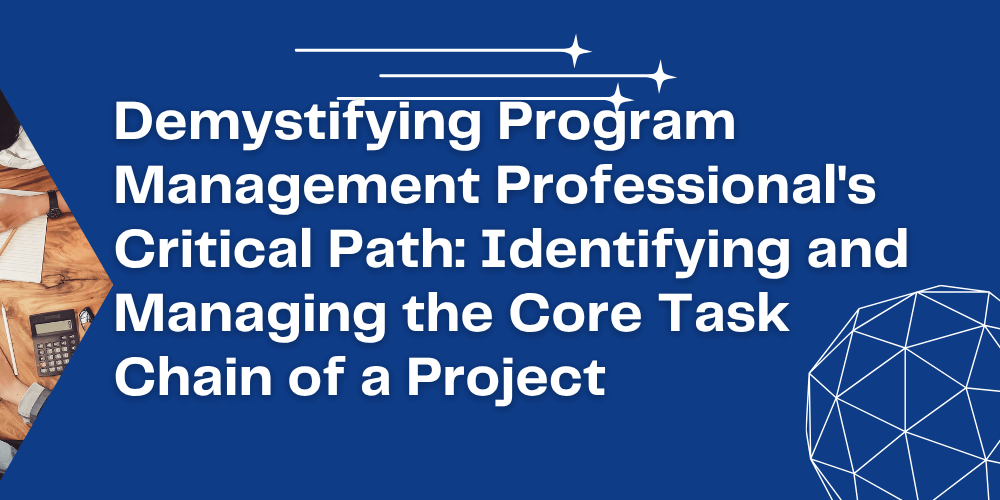TRUSTED BY THE SMARTEST TEAMS IN THE WORLD FOR CERTIFIED CANDIDATES
SPOTO Blogs
Useful learning materials to become certified IT personnel
-
- 670
- SPOTO 2
- 2025-08-01 15:09
-
- 734
- SPOTO 2
- 2025-08-01 15:02
-
- 542
- SPOTO 2
- 2025-07-31 16:14
-
- 1012
- SPOTO 2
- 2025-07-31 16:09
-
- 726
- SPOTO
- 2025-07-31 15:02
-
- 822
- SPOTO
- 2025-07-30 15:22
-
- 1274
- SPOTO
- 2025-07-30 15:15
-
- 785
- SPOTO 2
- 2025-07-30 14:14
-
- 538
- SPOTO 2
- 2025-07-30 14:07
TRUSTED BY THE SMARTEST TEAMS IN THE WORLD FOR CERTIFIED CANDIDATES
SPOTO Blogs
Useful learning materials to become certified IT personnel
-
- 670
- SPOTO 2
- 2025-08-01 15:09
Table of Contents1. What is Project Professional certification?2. Benefits of having Project Professional certification3. Understanding the PPR Certification4. Qualifying for the PPR Certification5. Similar certifications of Project Professional certification This guide provides an overview of the Project Professional (PPR) certification, covering its fundamental nature detailed specifications and core requirements. 1. What is Project Professional certification? The Project Professional (PPR) is a professional certification offered by the Association for Project Management (APM) in the UK. It verifies the holder's practical capabilities, professional knowledge, and applied skills across the entire project management lifecycle. It is a highly recognized intermediate and senior-level qualification in the UK and internationally, and serves as a crucial stepping stone towards the higher-level Chartered Project Professional designation. Focusing on real-world practice, the PPR certification (based on the APM Competence Framework) evaluates a practitioner's ability to apply project management principles, methods, and tools to solve complex project problems. It is not limited to a single methodology but covers a variety of project management approaches, including traditional and agile approaches, making it suitable for experienced practitioners seeking to demonstrate their project management expertise. 2. Benefits of having Project Professional certification The Project Performance Review (PPR) is a core certification offered by APM. Based on a globally recognized competency framework, it demonstrates the holder's practical ability to independently manage projects. Highly recognized in the UK and European project management markets, it serves as an authoritative endorsement of a practitioner's professional competence. In addition, the PPR serves as an accelerator for career advancement. For practitioners seeking to advance to senior project managers and project directors, the PPR serves as a "hard indicator" of competence. This is particularly true in sectors with strict project management standards, such as government, finance, and engineering. The PPR demonstrates that practitioners meet the experience and competency requirements and is a key path to applying for the ChPP, paving the way towards achieving top-tier project management qualifications. Certificate holders can join the APM professional community to gain access to the latest industry insights, training resources, and personal connections, providing access to industry resources and better supporting their career development. 3. Understanding the PPR Certification The PPR certification requires holders to demonstrate comprehensive capabilities across the entire project management process, covering key areas within the APM competency framework. These include the ability to understand and translate business needs; define project objectives, scope, deliverables, and success criteria; develop project plans, including schedules, resource allocation, and risk management plans; and establish project governance structures. These certifications include leading project teams to execute plans, monitoring progress, cost, and quality to ensure compliance with expected goals, managing change requests, assessing impacts and adjusting plans, maintaining project controllability, resolving project conflicts, and coordinating and reaching consensus among all parties. Practitioners are also required to conduct project closure and review, completing project deliverable acceptance checks to ensure that business needs are met, conducting project closure activities, and organizing review meetings to analyze lessons learned and provide reference for future projects. In addition, PPR certification holders are also required to possess project management soft skills, including leadership, communication, and problem-solving abilities. They must adhere to the APM Code of Ethics, ensure integrity and transparency in the project management process, and understand and integrate industry compliance requirements into project management. 4. Qualifying for the PPR Certification (1) Work Experience PPR-certified practitioners must possess at least three years of full-time project management experience and at least one year of project management leadership experience within the past five years, such as as a project manager or project leader. They must also demonstrate practical experience at the "Applied" level or higher across the ten core competency areas of the APM Competency Framework. (2) Assessment The PPR certification is assessed through a portfolio review and interview, rather than a traditional exam. Applicants must submit a detailed portfolio that includes a personal description of their career, highlighting their project management responsibilities and achievements; two to three case studies demonstrating specific practices, challenges, and achievements at different project stages; supporting documentation; and a record of continuing professional development (CPD) with at least 35 hours of project management-related learning completed in the past 12 months. After passing the portfolio screening, applicants will participate in a one-hour structured interview with an APM certification examiner to assess their understanding and application of project management knowledge, their problem-solving and leadership skills demonstrated in their case studies, and their understanding of the APM Code of Ethics. (3) Maintaining Certification PPR certification is valid for three years. Renewal requires submission of a cumulative 105 hours of CPD over three years and evidence of ongoing project management experience to ensure knowledge and skills remain current. 5. Similar certifications of Project Professional certification PMP (Project Management Professional) IPMP (International Project Management Professional) PRINCE2® (Projects IN Controlled Environments) CSPM (Certified Scaled Project Manager) PgMP® (Program Management Professional) -
- 734
- SPOTO 2
- 2025-08-01 15:02
Table of Contents1. What is Program Management Professional certification?2. Benefits of having Program Management Professional certification3. Understanding the PgMP® Certification4. Qualifying for the PgMP® Certification5. Similar certifications of Program Management Professional certification Get started with the Program Management Professional (PgMP®) certification to explore the PgMP®, learn its purpose and core requirements, core components and essential details. 1. What is Program Management Professional certification? Program Management Professional (PgMP®) is a high-level global certification offered by the Project Management Institute, specifically for experienced practitioners in program management. It validates the holder's ability to coordinate and manage multiple related projects to achieve organizational strategic objectives, making it a highly respected advanced qualification in project management. A "program" refers to a group of interconnected projects, sub-programs, and activities that, through collaborative management, achieve overall benefits unattainable by individual management. The PgMP® focuses on translating organizational strategy into actionable program objectives, coordinating cross-project dependencies, avoiding duplication of effort, resolving conflicts and maximizing synergies, and managing stakeholders, risks, and resources at the program level to ensure that the program ultimately delivers the expected business value. 2. Benefits of having Program Management Professional certification For individuals, the PgMP® certification serves as an authoritative endorsement of professional competence and expertise. The PgMP® focuses on the alignment of project portfolios with organizational strategy, rather than the execution details of a single project. It demonstrates to employers the ability to strategically plan and coordinate multiple, interconnected projects, identify cross-project dependencies, manage complex stakeholders, and ultimately deliver the desired business value. This competency is a key barrier to advancement from project managers to senior management. PgMP® holders often hold senior positions such as portfolio managers, senior project directors, and strategic planning leaders. As a high-level certification offered by PMI, the PgMP® is recognized in over 190 countries and regions worldwide. It is a preferred hiring requirement for cross-regional portfolio management positions, particularly within multinational corporations that prioritize standardized management, offering practitioners the potential for international career development. According to the PMI Global Salary Survey, PgMP® holders earn significantly higher average salaries than average project managers, with this premium being particularly pronounced within finance, technology, and multinational corporations. For enterprises, PgMP® holders master a systematic approach to project governance, effectively reducing resource waste, avoiding conflicts, proactively identifying potential risks, improving project integration efficiency, and ensuring the alignment of strategy and execution. PgMP® holders also help companies standardize internal management practices, particularly for large organizations with multiple business lines and regions, by improving collaboration and reducing management and communication costs. 3. Understanding the PgMP® Certification The PgMP® certification covers five core competency areas, including strategic program alignment—aligning programs with the organization's goals, mission, and vision, assessing strategic fit, defining program scope, and gaining stakeholder support. Benefits management for programs—identifying, planning, tracking, and achieving the program's expected benefits, ensuring that the benefits are quantifiable, aligned with the strategy, and sustained after the program's completion. The PgMP® certification also requires practitioners to identify and analyze stakeholders, develop a communication plan to manage expectations, resolve conflicts, and maintain support. Oversight mechanisms are established to monitor progress, approve changes, and ensure compliance. Lead the program from start to finish: phase reviews, operational transition, and closure. Coordinate project execution, resource allocation, and deliverable integration. 4. Qualifying for the PgMP® Certification PgMP® does not require a mandatory academic qualification but requires extensive practical experience. It is a certification with strict requirements for work experience. (1) Education and experience For practitioners with a bachelor's degree or equivalent, at least 4 years of project management experience and at least 7 years of portfolio management experience, which must have been completed within the past 15 years. For practitioners without a bachelor's degree, at least 7 years of project management experience and at least 10 years of portfolio management experience, which must have been completed within the past 18 years. (2) Assessment Practitioners need to submit an online application form, detailing their project and portfolio management experience, including roles, responsibilities, and achievements. The application undergoes review by a panel of PMI-certified portfolio management experts to validate the authenticity and relevance of the experience. After passing the review, they will take a 4-hour, 170-question multiple-choice exam that focuses on scenario analysis and tests their ability to apply knowledge in practice. (3) Maintaining Certification The PgMP® certification is valid for 3 years. To renew the certification, one must accumulate 60 professional development units within 3 years. These units can be obtained through training, presentations, and publication of relevant articles. 5. Similar certifications of Program Management Professional certification PRINCE2® Program Management (MSP®) IPMA Level A Portfolio Management Professional (PfMP) International Program Management Professional (PgMP) -
- 542
- SPOTO 2
- 2025-07-31 16:14
Table of Contents1. What is the meaning of Data Scientist?2. What is the Salary of a Data Scientist?3. Key Responsibilities of a Data Scientist4. Required Qualifications to Become a Data Scientist5. Occupations Similar to a Data Scientist This article explores the role of a Data Scientist, including key responsibilities, career information such as salary, and the qualifications needed to enter the field. 1. What is the meaning of Data Scientist? Data scientists are professionals who leverage skills such as statistics, machine learning, and programming to extract valuable insights from structured or unstructured data and translate them into actionable business decisions. Their core goal is to solve complex business problems through data, driving data-driven growth for the enterprise. They play a key role in connecting data with business value. The work of a data scientist revolves around "discovering patterns, predicting trends, and solving problems in data." This requires not only cleaning and processing massive amounts of data but also uncovering the underlying logic through methods like statistical modeling and machine learning. Ultimately, the analysis results are translated into concrete business action recommendations, rather than simply producing technical reports. 2. What is the Salary of a Data Scientist? Data scientist salaries vary depending on factors such as region, experience, industry, and company size. For a new data scientist with less than one year of experience, the average annual salary is approximately $88,108. With increasing years of work and experience, the average total compensation for a data scientist will gradually rise to $100,065. Data scientist salaries also vary by region. According to data, the average starting salary for a master's degree data scientist at a Silicon Valley tech company is $158,000, while the average starting salary for the class of 2026 at a San Francisco Bay Area tech company is $147,000. Those specializing in autonomous driving can earn over $180,000 annually. Data scientist salaries also vary significantly across different industries. For example, in high-tech and cutting-edge industries like technology and finance, the average starting salary for data scientists is $158,000. Data scientists in traditional manufacturing industries earn slightly less in comparison. In addition, the salary of a data scientist will also vary depending on the level of the position within the company. The salary of a digital science director will inevitably be much higher than that of a digital scientist. 3. Key Responsibilities of a Data Scientist The primary responsibility of a data scientist is to extract actionable insights from data to solve business problems and drive decision-making. These responsibilities span the entire data lifecycle, from problem definition to solution deployment. Data scientists define and structure business problems, collaborate with stakeholders, and translate vague business requirements into clear, data-driven questions. They align analytical objectives with business goals to ensure their work delivers tangible value. Data scientists also collect and prepare data, identify relevant data sources, and design strategies for collecting structured and unstructured data. They also clean and preprocess data to ensure quality, addressing missing, outlier, and duplicate values. Data scientists also use statistical methods and visualization techniques to analyze data, discover patterns, trends, and relationships, calculate descriptive statistics, identify key variables influencing business outcomes, and generate preliminary insights to guide further analysis or model development. Data scientists possess the skills to select and apply appropriate analytical methods for the problem, adjust hyperparameters, and test for overfitting to ensure model robustness. Ultimately, they translate complex analytical results into clear, actionable insights for non-technical stakeholders, present the results in reports that highlight key takeaways through storytelling, and collaborate with team leaders to ensure understanding and adoption of the insights. 4. Required Qualifications to Become a Data Scientist Becoming a data scientist requires technical skills, academic background, practical experience, and domain knowledge. (1) Education A bachelor's degree in statistics, mathematics or applied mathematics, computer science, data science or software engineering, economics, finance or operations research, physics, biology, or other STEM fields is typically required. In today's market, a master's degree in data science, machine learning, or statistics is increasingly sought after by top companies to demonstrate in-depth expertise in advanced modeling and analysis. Even positions involving cutting-edge research or highly specialized areas may require a doctoral degree. (2) Technical Skills Data scientists need to have some programming skills and knowledge of statistics and mathematics, including hypothesis testing, probability distributions, regression analysis, analysis of variance, experimental design, linear algebra, and calculus. They also need to be familiar with fundamental algorithms and understand model evaluation metrics. They also have experience with advanced techniques, can clean, transform, and preprocess messy data, and can create clear visualizations to convey insights to non-technical stakeholders. (3) Practical Experience Experience in data-related roles provides exposure to real-world workflows, tools, and business environments. Internship experience at many top companies or startups is highly valued, and recruiters prefer candidates with experience working with data or tools in specific fields. 5. Occupations Similar to a Data Scientist Data Analyst Machine Learning Engineer Data Engineer Quantitative Analyst -
- 1012
- SPOTO 2
- 2025-07-31 16:09
Table of Contents1. What is Chartered Project Professional certification?2. Benefits of having Chartered Project Professional certification?3. Understanding the Chpp Certification4. Qualifying for the Chpp Certification5. Similar certifications of Chartered Project Professional certification This article offers an introduction to the Chartered Project Professional (Chpp) certification. It covers the nature of the certification and its detailed specifications. 1. What is Chartered Project Professional certification? The Chartered Project Professional (ChPP) is a top-tier project management certification awarded by the Association for Project Management in the UK. It is one of the few project management qualifications globally to have received Royal Charter status. It represents professional excellence and leadership in project management and enjoys high authority and recognition in Commonwealth countries and globally. The ChPP focuses on leadership and professional practice throughout the lifecycle of complex projects. It requires not only practical skills in managing large and complex projects but also emphasizes professional influence, professional ethics, and sustained contributions within the industry. It is a "lifetime achievement" qualification for project management practitioners. It goes beyond a simple certification of technical proficiency to recognize a benchmark in project management professionalism. ChPP is not only a certification, but also a comprehensive recognition of the "leadership, practical depth and industry contribution" of project management professionals. It is one of the top honors in the global project management field. 2. Benefits of having Chartered Project Professional certification? The Chartered Professional (ChPP) is a British Royal Charter certification, a prestigious and prestigious institution in the global project management field. It is particularly well-recognized by government agencies and large corporations in the UK, Europe, and Commonwealth countries. It is a key advantage in high-profile project bidding and senior-level job applications, serving as an industry endorsement. ChPP's high global recognition generally allows holders greater access to top-tier project management positions, significantly higher salaries than typical project managers, and greater access to leadership positions on multinational and strategic projects. As Chartered Professionals, they have the opportunity to participate in APM standard-setting and international exchange activities, becoming industry opinion leaders and expanding their professional networks and voice. Companies with ChPP holders can enhance their competitiveness in complex projects and demonstrate to stakeholders that their project management capabilities meet world-class standards. 3. Understanding the Chpp Certification The Chpp certification is suitable for the highest person in charge of large and complex projects, such as multinational engineering directors, commanders-in-chief of major government projects, heads of corporate transformation project groups, or senior project managers who hope to improve their professional status in Commonwealth countries, European markets or international organizations, or leaders who are committed to becoming benchmarks in the project management industry and promoting the development of professional standards. 4. Qualifying for the Chpp Certification The ChPP certification threshold is extremely high and the process is rigorous, aiming to screen professionals with top project management capabilities and industry influence. (1) Work experience The application requirements first require at least 5 years of senior project management experience, of which at least 3 years have served in core leadership roles in complex projects, such as project director, chief project officer, and have led high-budget, large-scale, and high-risk projects. (2) Obtaining senior certification Secondly, practitioners are usually required to obtain senior certification from APM or equivalent international certification to prove that they have a solid foundation in project management. They must demonstrate continuous contributions in the field of project management, such as participating in industry association work, publishing professional content, and training newcomers. (3) Assessment During the assessment process, you need to submit materials, including a detailed career resume, especially highlighting your experience in leading complex projects, and project case statements that require quantifiable results, such as cost savings and efficiency improvements. In particular, you need to have two letters of recommendation from industry veterans to prove your professional ability and influence. This will be followed by an interview with a professional review panel composed of APM chartered members. The interview will be conducted in depth to explore the leadership, decision-making logic, risk management and industry contribution in the project case, and assess whether the candidate has met the standards of a "Chartered Professional." The APM assessment and interview fees are not included in the training fee. Each person needs to pay APM £839 plus VAT. (4) Maintaining certification After obtaining the certificate, Chpp certificate holders must complete a certain number of CPD hours each year and abide by the APM's code of professional ethics to maintain the validity of the certification. 5. Similar certifications of Chartered Project Professional certification Project Management Professional (PMP)® PRINCE2® Professional Certified ScrumMaster (CSM) IPMA Level A -
- 726
- SPOTO
- 2025-07-31 15:02
Table of Contents1. Is AWS Certification worth it? What are the benefits?2. What are the different levels of AWS certification?3. Who should pursue AWS Certification?4. How to Prepare for an AWS Professional Certification AWS certification is one of the most sought-after skills in the IT industry. Whether you're a seasoned IT professional or just starting out, earning an AWS certification can significantly enhance your career prospects. AWS is Amazon's cloud computing platform for managed servers, storage, networking, migration, compute, email, mobile app development, and security. Earning an AWS certification demonstrates your technical skills and knowledge required to manage, develop, and maintain AWS systems. 1. Is AWS Certification worth it? What are the benefits? AWS is a global leader in cloud computing, serving millions of customers worldwide. Earning an AWS certification can give you a competitive advantage in the job market and increase your career opportunities. Secondly, according to multiple industry reports, AWS-certified professionals tend to earn higher salaries than those without certifications. With proven expertise in cloud computing and AWS services, AWS-certified individuals can command higher salaries. Finally, passing an AWS certification exam officially recognizes your cloud computing skills. AWS certifications demonstrate your ability to deploy, manage, and scale AWS solutions. 2. What are the different levels of AWS certification? AWS certifications are categorized into four main tiers: Foundation: Suitable for beginners, such as the AWS Certified Cloud Practitioner. Associate: Intermediate-level certifications, such as Solutions Architect - Associate, Developer - Associate, and SysOps Administrator - Associate. Professional: Advanced-level certifications, including Solutions Architect - Professional and DevOps Engineer - Professional. Specialty: Focuses on specialized knowledge, such as advanced networking or machine learning. For most people just starting out, Foundation and Associate-level certifications are the preferred targets. If you're looking to advance into more specialized areas, you'll often need to pursue intermediate or advanced certifications. 3. Who should pursue AWS Certification? Professionals transitioning into cloud technology. AWS Certifications provide a validated benchmark, easing your path into cloud engineering or operations roles. Those seeking a higher salary and a path to breakthrough salary growth. Adding an AWS certification to your resume typically earns a 10-25% salary premium over non-certified peers. Those seeking increased career flexibility or a side hustle. Cloud skills are transferable across industries—from finance and healthcare to gaming and e-commerce. Case Study :Lily, A stay-at-home mom for years, she relaunched her career journey with AWS certification. Lily had been out of the workforce for years, focusing on raising her two young children. However, with rising household costs, she needed additional income to support her family and sought a career path with flexible schedules. After learning about the promise of cloud computing and remote technical positions, Lily decided to self-study AWS, starting with the basic Cloud Practitioner certification and gradually building her skills. She studied daily, using her children's naps and evenings for about two hours, systematically reviewing through official AWS training resources, the SPOTO platform, YouTube tutorials, and practice exams. In just four months, Lily successfully earned both the Cloud Practitioner and Solutions Architect – Associate certifications. After obtaining the certification, Lily began providing remote cloud architecture support, account configuration, and website hosting deployment services to local small and medium-sized businesses through LinkedIn, freelancing platforms, and community recommendations. She also takes on part-time projects, such as backup system setup, S3 file management, and lightweight security optimization. Currently, Lily earns a steady monthly part-time income of $600-800 USD and plans to increase her work hours after her child starts school. She is currently preparing for the AWS Certified Security – Specialty exam, hoping to move into more advanced cloud security roles in the future. 4. How to Prepare for an AWS Professional Certification First, review the official AWS Professional Certification exam guide to identify key areas and focus areas for structured preparation. Next, benchmark your knowledge, such as completing timed practice tests regularly, to measure knowledge retention, familiarize yourself with the exam format, and build confidence. Studying the core literature is also crucial. It's best to analyze the latest AWS whitepapers and technical documentation to master architectural best practices, security frameworks, and service implementation principles. To prepare for the exam, consider a comprehensive program like the SPOTO Certification Program, which combines theoretical instruction, practical exams, and hands-on lab environments. Take advantage of SPOTO's Solutions Architect and DevOps Engineer courses, which include video lectures, progressive assessments, and cloud-based labs for real-world scenario simulations. Case Study :Sophia's Transformation from Enterprise IT Engineer to AWS Professional Certification Holder Sophia is an enterprise engineer with many years of IT operations and development experience. As her company gradually migrated its architecture to the cloud, she realized she needed a more systematic understanding of cloud computing architecture and design to enhance her competitiveness in the workplace. After researching, she decided to pursue the highly prestigious AWS Certified Solutions Architect – Professional certification to demonstrate her technical depth and architectural prowess. She developed a four-month preparation plan, dedicating two hours each day after get off work to systematically study. She chose the highly reputable online course platform SPOTO and thoroughly read AWS whitepapers and service FAQs. Sophia placed a strong emphasis on practical application, using the AWS console to build a VPC, configure cross-account access policies, design a high-availability system architecture, and repeatedly practice multi-region deployment and disaster recovery plans. To test her understanding and test-taking skills, Sophia took multiple full-length practice exams, using SPOTO's certification question bank. This not only improved her answering speed but also helped her quickly identify key words for accurate answers. In the final stages, she conducted several comprehensive review sessions to identify mistakes and address weaknesses, ensuring she could flexibly address every exam topic. Ultimately, Sophia successfully passed the AWS Professional Certification and was subsequently appointed technical lead for a cloud migration project, earning a 20% salary increase. -
- 822
- SPOTO
- 2025-07-30 15:22
Table of Contents1. What does CCNP certification entail?2. Benefits of holding a CCNP certification3. CCNP vs CCNA certification4. How to prepare for CCNP exams5. Is CCNP certification worth it?6. What are the different CCNP specializations? 1. What does CCNP certification entail? CCNP, standing for Cisco Certified Network Professional, is a professional-level certification offered by Cisco Systems. It validates network professionals' ability to plan, implement, verify, and troubleshoot complex enterprise networks. This certification covers a range of networking technologies and is often a cornerstone of a career in the IT industry. As of February 2020, no entry-level certification is required to take the CCNP exam. 2. Benefits of holding a CCNP certification CCNP is an industry-recognized, authoritative certification and the global benchmark for networking expertise. Holding this certification demonstrates your ability to: design and implement complex networks; effectively troubleshoot; and maintain scalable infrastructure in enterprise environments. For employers, it serves as a reliable indicator of competence and reliability, distinguishing certified candidates from their competitors. Furthermore, with the rapid advancement of technology, the CCNP curriculum reflects emerging trends to stay ahead of the curve, including network automation and programmability, cloud-native networking, and other emerging technologies. Earning this certification ensures your skills remain current as the industry embraces innovation. CCNP-certified professionals are able to navigate a variety of environments, providing unparalleled flexibility in career choices. CCNP certification is highly sought after in industries such as healthcare, finance, and education. It provides you with advantages whether you are looking for a homepage or a side job. If you have CCNP certification, you can look for side jobs such as freelance network engineer, online technical instructor, IT content creator, remote technical support, etc. Real-life case 1: Earning Extra Income with CCNP Certification A network engineer with CCNP Enterprise and Security certifications shared his side hustle experience on Reddit. He stated, "I worked as a network engineer for several managed service providers (MSPs)... During the day, I was responsible for comprehensive support of customer environments and upgrades during off-hours... My 'consulting' fee was a flat $40/hour." He primarily assisted with setup and troubleshooting, billing by the hour. The standard rate of around $40/hour is ideal for network engineers who need flexible time outside of their primary job. Another user, a former IT professional with CCNP certification, now works part-time as a network support provider for small and medium-sized businesses. He shared, "I do consulting part-time after my main job and on weekends... I usually work with small shops... My hourly rate is half what a local managed service provider (MSP) charges... I don't usually work on their servers..." By providing common network services such as VLANs, wireless networking, routing, switching, and VPNs to local small businesses, charging them by the half-hour or hourly rate, he earns at least $3,000 per month in additional revenue. 3. CCNP vs CCNA certification The Cisco Certified Network Professional (CCNP) and the Cisco Certified Network Associate (CCNA) differ in the level of expertise they represent and the skills they assess. Choosing between CCNA and CCNP depends on your career goals and your current level of networking knowledge and experience. CCNA is an associate-level networking certification that covers a broad range of fundamental networking technologies and requires only one exam. CCNA is a foundational certification suitable for networking novices. CCNP is Cisco's professional-level networking certification, offering seven specializations that provide deeper and more detailed coverage of specific technical areas. CCNP requires passing two exams. CCNP is designed for experienced networking professionals who want to deepen their expertise and specialize in a specific networking area. 4. How to prepare for CCNP exams First, learn from Cisco certified professionals. They have the experience, expertise, and skills to help you pass the exam. The experts at SPOTO now know what to teach and how to train you. They'll ideally know how to create a study plan and cover all topics step-by-step. Second, gain the necessary practical experience. If you've taken other Cisco certification exams, you understand that without practical experience, you can't pass any Cisco exam. It's recommended to have one to three years of experience before taking the CCNP Enterprise exam to familiarize yourself with all Cisco CCNP Security devices. The exam requires an average of four to five hours of practical practice per day to familiarize yourself with the concepts and layout. Furthermore, to best prepare for the CCNP Enterprise exam, studying one topic at a time is a good approach. Don't read a book all at once; it's best to study one topic at a time. Read, understand, and then practice. Then move on to the next topic. Continue studying and practicing until you understand it. Finally, seek out additional exam resources. Books from Cisco Press are undoubtedly the best resources for any Cisco exam. However, they may not be sufficient. Therefore, we recommend that you choose SPOTO, which provides a wealth of exam materials to help you improve your exam preparation efficiency and pass rate. Real-life case 2: A successful job search for a low-educated network engineer after obtaining CCNP certification Before obtaining CCNP certification, he had been looking for a job for several months without success, so he used his free time to prepare for the CCNP exam. He shared his exam method: (1) Daily study: Read two books, take a quick look at the first time, and read carefully the second time until he can recall the general content of each chapter in the book. (2) Experiment: Although I had the equipment, I still completed all the flash experiments (three). I printed out the experimental materials and spent half an hour on the car to the exam. I basically didn't make any big mistakes in the experiments. (3) Question bank: Generally, I also took a quick look at the first time. Because my English is not good, I mainly memorized the words the first time. The second time I did it myself, wrote the answers in a notebook, and copied the questions I got wrong and the controversial questions. The third time I read the copied questions again. The experiment was excluded. At that time, it was still the old version of the exam, which had experimental questions. The question bank was provided by the SPOTO registration customer service, and it was very accurate. In addition, VOIP and VPN are important, as are IPTV and storage, which are what I use at work now, and Sun's Solaris system. If you have the chance, you can learn more about VOIP, VPN, and MPLS. 5. Is CCNP certification worth it? In the ever-evolving world of networking, the Cisco Certified Network Professional (CCNP) is one of the most coveted certifications for IT professionals. Whether you're looking to advance your career or deepen your technical expertise, CCNP opens the door to numerous opportunities. This certification validates your knowledge in areas such as routing, switching, security, and wireless networking, making you a valuable addition to any organization. Salaries increase significantly as careers advance. IT professionals with CCNP certifications typically earn higher salaries than those with entry-level certifications like CCNA. According to industry surveys, CCNP-certified network engineers earn an average annual salary between $80,000 and $120,000, depending on location, experience, and position. The financial benefits of earning a CCNP certification are significant, especially considering the time and effort required. If you're looking to boost your earning potential, CCNP is an excellent investment. 6. What are the different CCNP specializations? There are seven different CCNP levels: CCNP Enterprise, CCNP Security, CCNP Collaboration,CCNP Data Center and CCNP Service Provider. There's no single best CCNP to choose; each level has a different focus. This depends on various factors and the specific skills you're looking to develop. CCNP Enterprise: Focuses on routing, switching, and wireless technologies for enterprise networks. CCNP Security: Covers advanced security topics such as VPNs, firewalls, and intrusion prevention systems. CCNP Collaboration: Specializes in voice, video, and collaboration technologies. CCNP Data Center: Delves into data center infrastructure, including cloud and virtualization technologies. CCNP Service Provider: Focuses on service provider networks, including configuring large-scale, high-performance networks. -
- 1274
- SPOTO
- 2025-07-30 15:15
Table of ContentsIntroduction: The Real-Life Appeal of Part-Time IT WorkCase Study 1: Ben – From Warehouse Worker to Weekend Tech SupportWhat Exactly Is CompTIA A+ and Why It WorksCase Study 2: Anna – A Stay-at-Home Parent Making Time for TechHow to Go From Zero to Paid Part-Time Tech WorkRealistic Earnings: What Can You Make?Case Study 3: Carlos – University Student Building a PortfolioWhat's Next After A+?Conclusion: Real People, Real Paths, Real Results Introduction: The Real-Life Appeal of Part-Time IT Work For many, the idea of working part-time in IT feels out of reach, reserved for tech-savvy experts or those with a computer science degree. But in reality, thousands of people are discovering that you don't need a formal background to break into the tech world. Thanks to certifications like CompTIA A+, launching a flexible, part-time IT career is not only possible—it's happening every day. Whether you're a warehouse worker, a stay-at-home parent, or a university student, this globally recognized certification can open doors to meaningful, well-paying part-time roles. In this article, we'll walk through real-world case studies, break down the certification's value, and show you exactly how to turn your interest in tech into extra income—starting today. Case Study 1: Ben – From Warehouse Worker to Weekend Tech Support Ben, 29, spent most of his days moving boxes in a distribution center. Although he had always been interested in computers, he had never considered them as a career path. After stumbling across a YouTube video about CompTIA A+, he decided to give it a shot. He studied at night using free resources and spent weekends experimenting with his old laptop. Within three months, he passed both A+ Core exams. Shortly after, he landed his first freelance gig on Upwork, assisting a small business with troubleshooting its network. Ben now makes $500–$700 per month doing remote IT support on weekends and is currently studying for the Network+ certification. His long-term goal: transition into full-time tech work—but on his terms. What Exactly Is CompTIA A+ and Why It Works CompTIA A+ is a vendor-neutral, entry-level certification that teaches the essential skills needed to launch a career in IT support. It covers: Computer hardware and peripherals Operating systems (Windows, macOS, Linux) Basic networking and security Mobile devices and cloud technologies Troubleshooting and problem-solving To get certified, you must pass two exams: 220-1101 (Core 1): Hardware, mobile devices, networking, virtualization. 220-1102 (Core 2): Operating systems, security, troubleshooting, professionalism. What makes A+ so powerful is its practical focus. It teaches the real skills used every day by help desk staff, field technicians, and remote IT support specialists. And because it's widely recognized by employers, it gives you instant credibility—even if you're just starting out. Case Study 2: Anna – A Stay-at-Home Parent Making Time for Tech Anna had been out of the workforce for years, raising two young kids. She wanted to contribute financially but needed something that could fit around her family schedule. After reading about remote IT roles, she decided to pursue CompTIA A+. Using just two hours a day during nap time, Anna studied with a structured SPOTO course and took practice tests online. She passed the exams in four months. With her A+ credential, Anna offered part-time tech support to a nearby medical clinic two mornings per week. She also took on small freelance jobs like virus removal and PC cleanup via Facebook groups. Anna now earns $600/month and is studying for Security+, with plans to work more hours when her kids start school. How to Go From Zero to Paid Part-Time Tech Work You don't need to wait years to break into the IT industry. Here's a realistic roadmap to go from no experience to earning income: Step 1: Choose the Right Learning Materials Free options: Professor Messer (videos), ExamCompass (quizzes), Reddit (community support) Paid options: Udemy, Jason Dion practice tests, CompTIA's official Learn+ Choose what fits your learning style and schedule. Many complete both exams in 3–5 months with just 1–2 hours of study per day. Step 2: Pass the Exams Each exam costs around $246, but CompTIA often offers bundle discounts, especially for students and veterans. Schedule the test at a local center or take it online at home with proctoring. Step 3: Build Real-World Practice Even if no one is paying you yet, you can: Set up a home lab with old laptops and virtual machines. Volunteer for friends, family, or local nonprofits. Write about your troubleshooting process on LinkedIn or a personal blog. Step 4: Find Your First Gigs Look locally and online: Fiverr, TaskRabbit, Craigslist: Offer "basic tech help" services. Facebook community groups: Post about virus cleanup, printer setup, or laptop repair. Upwork: Set up a profile for remote IT support—many clients hire beginners with low rates and strong communication. Start small, build reviews, and raise your rates over time. Realistic Earnings: What Can You Make? In the early stages, part-time A+ holders typically earn: Role Hourly Rate Monthly (10–20 hrs) Freelance tech support $20–$30/hr $400–$800 Local break/fix work $25–$40/hr $500–$1,200 Remote help desk $15–$25/hr $300–$700 Your actual earnings depend on time availability, location, and how well you market your services. Some A+ certified techs even build full client rosters within 6–12 months. Case Study 3: Carlos – University Student Building a Portfolio Carlos, 21, was studying business in college but wanted tech skills for the future. He took A+ as a side project during his winter break. He posted on Reddit's r/techsupport, answered questions for free, and built his confidence. After getting certified, he found a part-time job managing software installs at a local school. Now, Carlos earns enough each month to cover rent and is considering switching majors to Information Systems. A+ gave him a low-risk way to test the waters before fully committing. What's Next After A+? Once you're confident with A+, there are many paths to grow: CompTIA Network+ – for more advanced networking jobs CompTIA Security+ – enter cybersecurity roles Microsoft 365 Fundamentals – specialize in Office/cloud services Google IT Automation with Python – add automation and scripting skills Each new skill expands your freelance offerings and increases your hourly rate. Conclusion: Real People, Real Paths, Real Results The CompTIA A+ certification isn't just a piece of paper—it's a key to opportunity. You don't need a degree, years of experience, or expensive equipment to begin your journey. What you do need is commitment, curiosity, and a willingness to start small. Ben, Anna, and Carlos didn't wait until they were "experts" to act. They got certified, found simple ways to apply their skills, and built part-time IT careers—one task at a time. If they can do it, so can you. -
- 785
- SPOTO 2
- 2025-07-30 14:14
Table of Contents1. What is the Systems Security Certified Practitioner certification?2. What are the benefits of having a Systems Security Certified Practitioner certification?3. Understanding the SSCP Certification4. Qualifying for the SSCP Certification5. Similar certifications of Systems Security Certified Practitioner certification This article provides an overview of the Systems Security Certified Practitioner (SSCP), explains the SSCP certification in detail, and describes the necessary qualifications to obtain it. By reading this article, you will gain an in-depth understanding of the Systems Security Certified Practitioner certification. 1. What is the Systems Security Certified Practitioner certification? The Systems Security Certified Practitioner (SSCP) is an intermediate-level information security professional certification offered by the International Information System Security Certification Consortium. It focuses on validating practitioners' practical operational capabilities in security operations, monitoring, response, and maintenance of information system security. It is a leading qualification in the information security field, particularly in security operations and technical implementation. The SSCP certifies professionals responsible for implementing and maintaining organizational security measures. Unlike advanced certifications, which focus more on strategic planning and management, the SSCP emphasizes the implementation of security practices, including monitoring system security status, responding to security incidents, configuring access controls, and maintaining network and system security. This core certification bridges security theory with practical application, making it suitable for mid-career practitioners focused on security technology implementation. 2. What are the benefits of having a Systems Security Certified Practitioner certification? The SSCP is a globally recognized intermediate-level security certification that emphasizes "learning by doing," demonstrating the holder's practical ability to implement security measures and respond to security incidents, rather than simply theoretical knowledge. It serves as authoritative proof of real-world capabilities. For practitioners transitioning from entry-level security positions to mid-level positions, the SSCP is a key indicator of competency upgrade. It is particularly highly recognized within enterprise security operations teams and cybersecurity departments, serving as a key springboard for career advancement. According to the (ISC)² Global Salary Survey, SSCP holders earn an average annual salary 15%-20% higher than non-certificate holders. They are also more likely to be sought after by employers, with employers preferring SSCP holders over those without the certification, particularly in security-critical industries such as finance, technology, and government. The SSCP is a bridge between the upper and lower levels of the (ISC)² system. Certified individuals can subsequently accumulate experience and pursue the more advanced CISSP certification, establishing a career path from intermediate-level practitioners to senior management. In short, SSCP is a core certification for "practitioners" in the field of information security. Its core value lies in verifying practitioners' practical ability to implement security measures and maintain system security. It is an important milestone in the career development of technical security talents. 3. Understanding the SSCP Certification The SSCP exam is based on the (ISC)² General Body of Knowledge and covers seven core areas: Security Operations and Administration; Access Controls; Risk Identification, Monitoring, and Analysis; Communications and Network Security; Systems and Application Security; Cryptography; and Security Assessment and Testing. SSCP candidates face 125 multiple-choice questions, with 25 being unscored pretest items. It lasts three hours and can be taken in multiple languages, including English and Chinese. The maximum score is 1,000, with a passing score of 700. The exam fee is US$249 for (ISC)² members and US$375 for non-members. 4. Qualifying for the SSCP Certification (1) Meet the work experience requirement Applicants must possess at least one year of paid full-time work experience in at least one of the seven knowledge domains covered by the (ISC)² SSCP exam. These domains include security operations and management, access control, risk identification, monitoring and analysis, incident response and recovery, cryptography, and network and communications security. This experience must be cumulative. If this experience requirement is not met, applicants can first pass the exam to become an "(ISC)² Associate" and then accumulate and obtain the required one year of experience within two years after passing the exam. (2) Pass the SSCP exam Applicants must successfully pass the SSCP exam, which is designed to assess the candidate's technical ability and knowledge in implementing, managing, and maintaining IT infrastructure security best practices. (3) Obtain endorsement After passing the exam and meeting the work experience requirement, applicants must submit an endorsement application signed by a current (ISC)² certified professional. The endorser is required to verify the authenticity of the applicant's work experience statement and attest to their good moral character. (4) Maintaining Certification The certification is valid for 3 years. After obtaining the certification, 60 CPE credits must be accumulated every 3 years. The certificate holder needs to pay an annual membership fee to maintain the validity of the certification and pay an annual maintenance fee of approximately US$85 per year to maintain the validity of the certification. 5. Similar certifications of Systems Security Certified Practitioner certification CompTIA Security+ GIAC Security Essentials (GSEC) CompTIA Cybersecurity Analyst+ (CySA+) Certified Information Systems Security Professional (CISSP) Associate Council Certified Network Defender (CND) -
- 538
- SPOTO 2
- 2025-07-30 14:07
Table of Contents1. What is a Data Architect?2. Responsibilities of a Data Architect3. How much does a Data Architect Make?4. What Are the Qualifications to Become a Data Architect?5. Similar Occupations of Data Architect This article provides an overview of the Data Architect, explains the DA profession in detail, and describes what is necessary to become one. By reading this article, you will gain an in-depth understanding of the profession of Site Reliability Engineer. 1. What is a Data Architect? Data architects are technical experts specializing in GCP data services, responsible for designing end-to-end data system architectures within the GCP ecosystem. Their core goal is to align business needs with the features of GCP data services to design efficient, scalable, secure, and cost-optimized data architectures. This supports the entire data lifecycle, from acquisition, storage, processing, analysis, and application, ultimately enabling data-driven business decisions. Data architects' work revolves around implementing best practices for GCP data services. Therefore, data architects need to understand core business needs for data and be proficient in the features of GCP's various data services. This allows them to design solutions that adapt technology to the business and support growth through architecture. They serve as a bridge between business needs and GCP's technical capabilities, and they plan the long-term evolution of data systems. 2. Responsibilities of a Data Architect Data architects' responsibilities include data architecture design and planning. They are responsible for designing the overall data architecture based on business objectives and clearly defining the data flow path from data sources to GCP storage, processing, and analytics layers. Next, data architects develop a data architecture evolution roadmap to ensure the architecture supports business growth and allows for technology upgrades. Data architects also select the best GCP services based on the scenario, implement real-time streaming data processing, data scheduling, and workflows, evaluate inter-service integration to avoid technology silos, and design data models and processes. Furthermore, data architects are responsible for designing security and compliance architectures. This includes building a data security system based on GCP security tools to encrypt and protect sensitive data, optimizing performance and costs, optimizing data processing performance, selecting appropriate storage types, and monitoring resource consumption through GCP cost management to avoid waste. Cross-team collaboration and standards-setting skills are also key hallmarks of a successful data architect. This includes collaborating with data engineers to translate architectural designs into workable technical solutions and ensure consistent implementation. They also communicate with business teams to understand data requirements, translate them into architectural design constraints, and establish data architecture standards to ensure efficient team collaboration. 3. How much does a Data Architect Make? Salaries for data architects, particularly those specializing in GCP data services, vary widely, influenced by factors such as location, experience, industry, company size, and technical expertise. According to data, entry-level data architects can earn between $80,000 and $120,000 per year.Mid-career data architects with three to eight years of experience can earn between $120,000 and $180,000 per year, while senior data architects with more than eight years of experience and in leadership positions can earn upwards of $180,000 to $250,000 per year. In regions like North America, Western Europe, and Australia, salaries are typically higher due to the demand for cloud-native expertise. For example, in Silicon Valley, data architects specializing in GCP can earn annual salaries exceeding $200,000 working for tech giants like Google or Fortune 500 companies. GCP expertise is highly sought after due to its increasing popularity in cloud-native and AI-driven enterprises. GCP Professional Data Engineer or GCP Professional Cloud Architect certification holders typically command 10-30% higher salaries globally. Companies using GCP's BigQuery, Dataproc, or Vertex AI prioritize architects with practical experience designing scalable data pipelines and analytics platforms. Different industries also influence data architect salaries. For example, the tech and internet sectors command the highest salaries due to the high demand for cloud computing and AI expertise. For example, GCP data architects at top Chinese tech companies like Alibaba and Tencent earn 30-50% more than their counterparts in traditional industries. From a company size perspective, large multinational corporations often offer higher salaries and benefits, while startups and SMEs offer lower base salaries but may offer equity or rapid growth opportunities. Therefore, candidates can choose a company's industry and size based on their individual needs. Additionally, professionals with mastery of the GCP technology stack, cross-cloud capabilities, and emerging technologies, as well as expertise in AI or machine learning integration, real-time streaming, or data lake design, can receive additional rewards. Earning a GCP Professional Data Engineer, CISSP, or CDPSE certification can enhance your credibility and network, as can joining a GCP user group or attending Cloud Summits to stay informed about the latest trends. Highlighting GCP-related achievements during salary negotiations can all have an impact on a data architect's salary. Region also plays a significant role in salary: North America, with Silicon Valley being particularly strong, offers some of the highest salaries globally. European salaries are competitive, but generally lower than those in the US. Asia-Pacific is experiencing rapid growth in China and India, while salaries in Australia and New Zealand are relatively high. 4. What Are the Qualifications to Become a Data Architect? (1) Technical foundation Be proficient in the principles, applicable scenarios, and limitations of GCP data services, and be able to prescribe the right solution based on business needs. (2) Data Modeling Skills Understand the characteristics of structured, semi-structured, and unstructured data, master data warehouse modeling methods such as star schema and snowflake schema, and be able to design efficient storage structures. (3) Distributed System Cognition Understand concepts such as distributed computing, stream processing, and data consistency, and cope with the challenges of large-scale data scenarios. (4) Business Translation Skills Translate vague business requirements into clear technical indicators. (5) Cost and Risk Awareness Find a balance between performance and cost, anticipate potential risks in the architecture, and design solutions to address them. 5. Similar Occupations of Data Architect Data Engineer Database Administrator (DBA) Data Warehouse Architect Cloud Data Engineer














